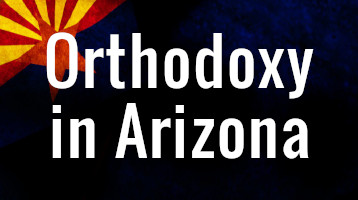![]()
by Fr. Patrick Henry Reardon
It is reasonable, I suppose—or at least natural—for modern students of religion to wonder how the earliest Christians, all of them Jews, were able to reconcile their belief in the divinity of Christ with the monotheism enshrined in Israel’s Sh’ma’. Indeed, historians of Christian thought have devoted many studies to that inquiry.
Looking at the apostolic writings through the lens of this inquiry, I gain an interesting impression of the earliest Christians: Their confession of the divinity of Jesus, while it was difficult, seems not to have been complicated.
First, the recorded difficulty of the apostles was not an impasse of reason (“How can this Jesus be both God and man?”) but a failure of perception (“They did not understand about the loaves, because their hearts were hardened”—Mark 6:52; Cf. 8:13-21).
Second, when they did arrive at this profession, in due course, the journey was not complicated. Their arrival did not result from a subtle mental process (“Well, let’s see, perhaps He is one person in two natures.”) but from an immediate experience involving both Jesus’ identity and their own destiny:
“You have the words of eternal life, and we have come to believe and to know that You are the Holy One of God (ho Hagios tou Theou)” (John 6:68-69).
It is most significant that the two verbs introducing Peter’s confession—“to believe and to know”—are expressed in the Greek perfect tense: pepistevkamen kai egnokamen. The nuance of the expression is subtle; the apostles, when they reflect on what they now confess, perceive that they already know the identity of Jesus. Even though they have not figured it out, they discover it is already an established conviction—a prior, implicit knowledge of Jesus’ identity. Peter, faced abruptly with the question of leaving Jesus (“Will you also depart?”), immediately discerns why he and the others cannot do it: They know who He is! Abandoning Him, they would forfeit eternal life.
We should go further in this reflection, I think. Why else would Jesus ask the apostles, “Will you also depart”? Jesus needs information on this score? Hardly. He poses the question, rather, and thus puts the apostles on the spot, precisely in order to bring their minds to the realization of what, in fact, they have already come to know. His question to them raises to the conscious surface of the apostles’ minds a conviction to which they already adhere. It is not proper to speak, in this case, of “doctrinal development.” The apostles are not trying to find the right words to confess a complex and knotty idea.
The apostles are making, rather, a basic creedal statement. In its full form it runs like this: “I believe in one Lord, Jesus Christ.” He is one Lord, because—as all Jews know (and would lovingly die for)—
“the Lord is one,” ‘Adonai ‘ehad (Deuteronomy 6:4; Ephesians 4:5).
Jesus is identified in the terms of the Sh’ma’. In the Bible, monotheism is about identity.
The apostles make this step in response to Jesus’ assertion,
“I came forth from the Father,” (exselthon para tou Patros) (16:28).
They affirm this claim, not because of a religious theory that warrants it, but because, as they watch and listen to Jesus, they discern in Him the One who sent Him:
“”He who sees Me sees Him who sent Me” (John 12:45).
“He who has seen Me has seen the Father” (4:49).
Modern students of religion, regarding the matter as an intellectual dilemma, try to imagine how the apostles, when they affirmed Jesus’ divinity, were able—as a point of logic—to reconcile that affirmation with their monotheism. In the apostolic corpus, however, there is not the slightest indication that the apostles experienced Jesus’ divinity as an intellectual dilemma. What, then, did the apostles suppose that modern students of religion do not suppose?
It is this: For modern students of religion—generally speaking—monotheism involves a fundamentally mathematical thesis – There is one God, as distinct from “more or fewer” than one God; start counting gods, and when you get to one, stop. Consequently, all those who believe in one God must logically believe in the same God.
This approach to monotheism is what allows our contemporaries to speak of “the monotheistic religions.” Their thesis is simple: ‘Since there is only one God, all those who believe in one God believe in the same God. Their differences are those of development and/or expression.’
This thesis is not only simple; it is simply absurd.
Biblical monotheism is not about mathematics; it is about God’s identity: Who is this one God? Who He is, is the essential question. I cite a noted authority on the point,
’im Adonai (IHWH) ’Elohim l-ku ’aharaiv; v-’im ha-Ba‘al l-ku ’aharaiv—
“If the Lord is God, follow Him: but if Baal, then follow him” (1 Kings 18:21).
Elijah knew, of course, that Baal belonged to a pantheon, but this consideration was not the point. Baal was not a false god because he had relatives. He was a false god because he was not
“the Lord, our God.”
Elijah’s monotheism was not a matter of counting but of identifying.
The question was not, How many gods? but who is God?
And this is the reason the confession of Jesus never became, in the eyes of the Church, a challenge to biblical monotheism. In the Orthodox faith Jesus is divine because He pertains to—is included in—the identity of God. Gradually this truth became perfectly clear to a certain fishermen, an improbable tax collector, and some women of their company.
Their conviction on the point was a big and difficult step, but it wasn’t complicated.



